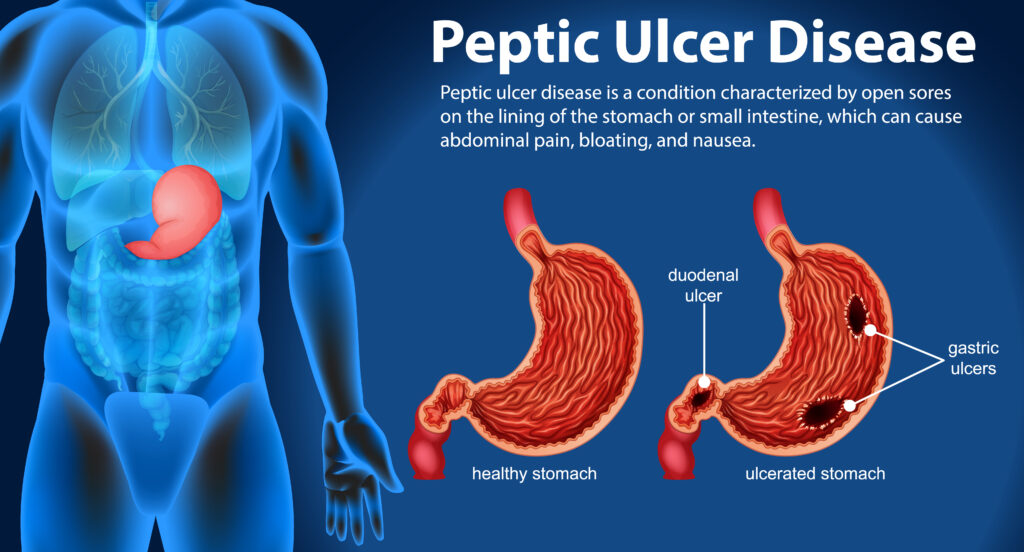Peptic ulcers, another name for gastric ulcers, are open sores that form on the stomach lining. If these ulcers are not treated, they may cause pain, discomfort, and consequences. In 2024, keeping digestive health and general well-being requires knowledge of the causes, signs, and available treatments for stomach ulcers.
Introduction
For many years, gastric ulcers have posed a serious threat to global health, impacting millions of individuals. Gastric ulcers still provide a threat to people’s health and quality of life, despite advancements in medical understanding and available treatments. We will examine the most recent data about stomach ulcers in 2024 in this post, covering their causes, symptoms, diagnosis, treatment, and preventative measures.

What Causes Gastric Ulcers?
When the stomach’s protective lining erodes and exposes underlying tissues to stomach acids, gastric ulcers can result. The following are some of the variables that may lead to the development of stomach ulcers:
Infection with Helicobacter pylori: This bacteria damages the stomach’s protective mucous membrane, leaving it more vulnerable to damage from stomach acids and is a major cause of gastric ulcers.
Nonsteroidal anti-inflammatory medicines (NSAIDs): By irritating the stomach lining and preventing it from healing itself, NSAIDs including aspirin, ibuprofen, and naproxen can raise the risk of gastric ulcers when used regularly.
Overindulgence in alcohol: Alcohol can aggravate the lining of the stomach and raise the production of stomach acids, which can result in the development of ulcers.
Smoking: Smoking raises the possibility of complications and can hinder the healing of stomach ulcers.
Stress: Although stress can not directly cause stomach ulcers, it can make symptoms worse and slow the healing process for those who already have ulcers.
Symptoms of Gastric Ulcers
The symptoms of gastric ulcers can vary from person to person and may include:
Abdominal pain: This is the most common symptom of gastric ulcers, typically occurring in the upper abdomen and often described as a burning or gnawing sensation.
Indigestion: Individuals with gastric ulcers may experience bloating, belching, and feelings of fullness after eating.
Nausea and vomiting: Some individuals may experience nausea and vomiting, particularly if the ulcer is causing obstruction or inflammation in the stomach.
Loss of appetite: Gastric ulcers can lead to a reduced appetite and unintended weight loss over time.
Diagnosis and Treatment
If gastric ulcers are suspected, a healthcare professional will perform a thorough evaluation, which may include:
Medical history: Your doctor will ask about your symptoms, medical history, and any medications or supplements you are taking.
Physical examination: A physical examination may reveal signs of abdominal tenderness or bloating.
Diagnostic tests: Tests such as an upper endoscopy, blood tests, or stool tests may be performed to confirm the presence of an ulcer and identify any underlying causes, such as H. pylori infection.
Once diagnosed, treatment for gastric ulcers may include:
Medications: Proton pump inhibitors (PPIs) and H2-receptor antagonists are commonly prescribed to reduce stomach acid production and promote ulcer healing. Antibiotics may also be prescribed to eradicate H. pylori infection.
Lifestyle changes: Avoiding NSAIDs, alcohol, and smoking can help reduce irritation to the stomach lining and promote healing. Eating smaller, more frequent meals and avoiding spicy or acidic foods may also provide relief.
Surgery: In rare cases where ulcers do not respond to medication or complications such as bleeding or perforation occur, surgery may be necessary to repair the ulcer and address any underlying issues.
Prevention Strategies
While some risk factors for gastric ulcers, such as genetic predisposition, cannot be controlled, several preventive measures can help reduce the risk of developing ulcers:
Limit NSAID use: If possible, avoid or minimize the use of NSAIDs. If you require these medications for chronic pain or inflammation, talk to your doctor about alternative options or strategies to reduce their impact on your stomach.
Practice good hygiene: Wash your hands regularly, especially before eating or preparing food, to reduce the risk of H. pylori infection.
Moderate alcohol consumption: If you choose to drink alcohol, do so in moderation, and avoid excessive or binge drinking.
Manage stress: Practice stress-reducing techniques such as mindfulness, meditation, yoga, or deep breathing exercises to help manage stress levels and promote overall well-being.
Home remedies that can help alleviate symptoms of gastric ulcers
Probiotics: Consuming probiotic-rich foods like yogurt or kefir can help restore the balance of healthy bacteria in the gut and promote digestive health. Probiotics may also help reduce inflammation and strengthen the protective lining of the stomach.
Aloe vera: Aloe vera has soothing properties that can help reduce irritation and inflammation in the stomach lining. Drinking aloe vera juice or consuming aloe vera gel in moderation may provide relief from gastric ulcer symptoms.
Licorice root: Licorice root contains compounds that can help protect the stomach lining and promote ulcer healing. DGL (deglycyrrhizinated licorice) supplements are available and may be safer for long-term use compared to regular licorice root.
Chamomile tea: Chamomile tea has anti-inflammatory and calming properties that can help reduce stomach acidity and soothe gastric ulcer symptoms. Drinking chamomile tea between meals may help alleviate discomfort and promote digestion.
Slippery elm: Slippery elm is a demulcent herb that forms a soothing gel-like substance when mixed with water. Consuming slippery elm supplements or drinking slippery elm tea may help coat the stomach lining and protect against irritation.
Ginger: Ginger has natural anti-inflammatory properties and can help reduce stomach acidity. Consuming ginger tea or adding fresh ginger to meals may help alleviate gastric ulcer symptoms and promote digestive health.
Turmeric: Turmeric contains curcumin, a compound with potent anti-inflammatory and antioxidant properties. Adding turmeric to dishes or taking turmeric supplements may help reduce inflammation in the stomach and support ulcer healing.
Cabbage juice: Cabbage juice is rich in vitamin U, a compound that may help protect the stomach lining and promote ulcer healing. Drinking freshly prepared cabbage juice on an empty stomach may help soothe gastric ulcer symptoms.
Honey: Manuka honey, in particular, has antibacterial properties that may help inhibit the growth of H. pylori bacteria, a common cause of gastric ulcers. Consuming a spoonful of honey or adding it to warm water or herbal tea may help promote ulcer healing.
Lifestyle modifications: In addition to these home remedies, making lifestyle changes such as avoiding spicy or acidic foods, eating smaller, more frequent meals, practicing stress-reducing techniques like meditation or yoga, and getting regular exercise can help manage gastric ulcer symptoms and promote overall digestive health.
It’s crucial to remember that although these natural cures could help some people feel better, they cannot replace medical care. To ensure an accurate diagnosis and course of treatment, it’s critical to speak with a healthcare provider if you think you may have a stomach ulcer or if your symptoms are becoming worse.
Conclusion
In summary, stomach ulcers are a common digestive ailment that, if ignored, can lead to discomfort and consequences. In 2024 and beyond, people may manage their stomach ulcers and support digestive health by being aware of the origins, symptoms, and available treatment choices.
FAQs (Frequently Asked Questions)
While some small ulcers may heal on their own with time and supportive measures such as medication and lifestyle changes, larger or persistent ulcers often require medical intervention to promote healing and prevent complications.
No, gastric ulcers themselves are not contagious. However, the bacterium H. pylori, which is a common cause of gastric ulcers, can be transmitted from person to person through contaminated food, water, or close contact.
While stress alone is not a direct cause of gastric ulcers, it can exacerbate symptoms and delay healing in individuals already affected by ulcers. Managing stress through relaxation techniques and stress-reducing activities may help improve ulcer symptoms.
It is generally not recommended to take over-the-counter pain relievers such as aspirin, ibuprofen, or naproxen if you have gastric ulcers, as these medications can worsen ulcer symptoms and delay healing. Always consult with a healthcare professional before taking any medications if you have gastric ulcers.
While dietary changes alone may not prevent gastric ulcers, adopting a balanced diet that includes plenty of fruits, vegetables, whole grains, and lean proteins can help support overall digestive health and reduce the risk of complications associated with ulcers.



